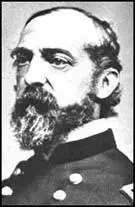George Meade

George Meade, the son of a United States naval agent, was born in Cadiz, Spain, on 31st December, 1815. After graduating from the U.S. Military Academy at West Point in 1835 he served only a year in the United States Army before resigning to become a civil engineering. He rejoined the army in 1842 and saw action in the Mexican War (1846-48).
On the outbreak of the American Civil War he was commissioned brigadier general in command of the 2nd Brigade of the Pennsylvania Reserves. Meade took part in the 2nd Battle of Bull Run and the the Battle of Chancellorsville in May, 1863. On 28th June, 1863, President Abraham Lincoln appointed Meade to replace General Joseph Hooker in charge of the Army of the Potomac.
During the summer of 1863 Robert E. Lee decided to take the war to the north. The Confederate Army reached Gettysburg, Pennsylvania on 1st July. The town was quickly taken but the Union Army, led by Meade arrived in force soon afterwards and for the next two days the town was the scene of bitter fighting. Attacks led by James Jeb Stuart and James Longstreet proved costly and by the 5th July, Lee decided to retreat south. Both sides suffered heavy losses with Lee losing 28,063 men and Meade 23,049.
Meade worked under Ulysses S. Grant who later commented that: "Meade was brave and conscientious, and commanded the respect of all who knew him. He was unfortunately of a temper that would get beyond his control at times. No one saw this better than he himself, and no one regretted it more. This made it unpleasant at times, even in battle, for those around him to approach him even with information." His aide, Theodore Lyman also criticised him after the war claiming that "I don't know any gentleman, who, when he is wrathy, exercises less of Christian charity than my well-beloved Chief."
After the war Meade commanded the Division of the Atlantic. In 1867 he was put in charge of the Reconstruction district that included Alabama, Georgia and Florida. George Meade died of pneumonia in Philadelphia on 6th November, 1872.
Primary Sources
(1) Ulysses S. Grant, Personal Memoirs of U.S. Grant (1885)
Meade was brave and conscientious, and commanded the respect of all who knew him. He was unfortunately of a temper that would get beyond his control at times. No one saw this better than he himself, and no one regretted it more. This made it unpleasant at times, even in battle, for those around him to approach him even with information.
(2) General Oliver Howard wrote about the appointment of George Meade as commander of the Army of the Potomac in June, 1863, in his autobiography published in 1907.
I had known Meade before the war, having met him and traveled with him on our northern lakes when he was on engineering duty in that region, and I had seen him frequently after the outbreak of hostilities. As I entered his tent, he extended his hand, and said: "How are you, Howard?" He demurred at any congratulation. He looked tall and spare, weary, and a little flushed, but I knew him to be a good, honest soldier, and gathered confidence and hope from his thoughtful face. To him I appeared but a lad, for he had graduated in 1835 at the Military Academy, nineteen years before me. He won me over by his thoroughness and fidelity than by any show of sympathy or companionship. To me, of course, he stood in the light of an esteemed, experienced regular officer, old enough to be my father, but like a father that one can trust without his showing him any special regard. So we respected and trusted Meade from the beginning.
(3) Ulysses Grant, letter to Edwin M. Stanton, Secretary of War (13th May, 1864)
General Meade has more than met my most sanguine expectations. He and Sherman are the fittest officers for large commands I have come in contact with. In their services can be rewarded by promotion to the rank of Major-Generals in the regular army the honor would be worthily bestowed, and I would feel personally gratified. I would not like to see one of these promotions at this time without seeing both.
(4) Theodore Lyman, aide to George Meade during the American Civil War, commented on his personality after the conflict.
I don't know any gentleman, who, when he is wrathy, exercises less of Christian charity than my well-beloved Chief.

